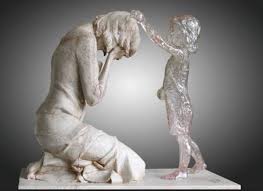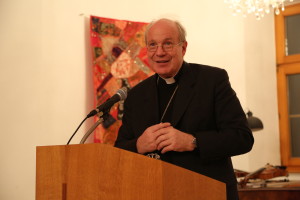In a recent tweet of Pope Francis we can read a clear exhortation: “The laity are called to become a leaven of Christian living within society“. This is indeed what our deeply confused society needs very much today and it still seems to be little understood by many Christians themselves. Is the Christian life sufficiently visible in Western societies to the point where Christians are a leaven? As Christians we often complain about aggressive secularization and about the many evil laws that are crowding the statute books – like those legalizing abortion or euthanasia -, yet we fail to see that these laws and policies have been developing for decades under our very own eyes as we live our comfortable lives of either being just lukewarm Christians or those hidden behind walls of self-righteousness, who certainly do many good works in society but who too often still refuse to be in that same society what Christ has called us to be: a sign of contradiction.
For example, let us take a look at the Christian democratic parties in Western Europe. They can be held largely (co-)responsible for the introduction over the past decades of a wide variety of laws that diametrically oppose the core tenets of Christian doctrine on life, marriage, family and education. Mostly the argument being used in defense of Christian politicians voting in favor of such ‘laws’ is that by doing so they are “avoiding a bigger evil”, for example by legalizing abortion to avoid women dying from illegal abortions in shady clinics. Now whilst such tragedies indeed need to be eradicated, this common defense of abortion liberalization ignores a fundamental principle of Christian theology: that doing one evil in order to avoid another evil is still evil and thus morally unacceptable. The end does not justify the means; even a good end does not justify evil means.
As Christians, we have increasingly lost our voice in democratic society, and we are mostly ourselves to blame for it. We have chosen to constantly compromise and seek consensus, rather than to explore common ground based on core principles. From leading the culture throughout centuries, we have been allowing more and more to be led by the culture, a culture that has now become openly hostile towards the reality of the created order and the Christian defense thereof. Out of fear or out of expediency, a majority of Christian politicians and other policy-makers has stopped defending the natural and unchangeable order of God’s creation, the God they however still profess to believe in. A recent example here in Austria underlines this point: the Austrian parliament last month passed a controversial law further liberalizing reproductive medicine including destructive practices in cases of malformed human beings in the embryonic stage. The law also answers a claim that same-sex couples have “the right to a child” – thus essentially ignoring the rights of the child. The non-discrimination argument in favor of same-sex couples now trumps the natural physical and emotional need of every child to be brought up by a father and a mother, preferably the biological parents. The law furthermore liberalizes access to “pre-implantation diagnosis”, effectively widening the scope for destroying the life of human beings in the embryonic stage that show genetic disorders and are therefore deemed ‘unworthy of life’. Out of the 47 members of the supposedly Christian democratic ÖVP party, only 4 members voted against the law. This in spite of the fact that extensive evidence highlighting the severe ethical problems posed by the law was made public and the public debate asked for by many was never held.
A society that sheds its Christian bearings and cuts the life-giving roots to the objective reality of the natural created order ultimately also sheds its humanity and becomes barbaric. We have seen enough examples of this in the history of mankind, where laws that are meant to be the guardians of justice in fact become the instruments of mass killing and human destruction. The rejection of natural law along with the expulsion of Christian theology from society is always followed by de-humanization – when positive law is decoupled from the transcendent and focuses only on the individual or group desire of any given time. The Jewish agnostic writer Hannah Arendt masterfullly expressed this truth in her 1946 book “The Origins of Totalitarianism” where she writes:
“A conception of law which identifies what is right with the notion of what is good for – for the individual, or the family, or the people, or the largest number – becomes inevitable once the absolute and transcendent measurements of religion or the law of nature have lost their authority. And this predicament is by no means solved if the unit to which the ‘good for’ applies is as large as mankind itself. For it is quite conceivable, and even within the realm of practical political possibilities, that one fine day a highly organized and mechanized humanity will conclude quite democratically – namely by majority decision – that for humanity as a whole it would be better to liquidate certain parts thereof. Here, in the problems of factual reality, we are confronted with one of the oldest perplexities of political philosophy, which could remain undetected only so long as a stable Christian theology provided the framework for all political and philosophical problems, but which long ago caused Plato to say: “Not man, but a god, must be the measure of all things.”
Indeed, God is the measure of all things, not the majority opinion nor the minority pressure group. The way we have to re-Christianize the West is to bring back to society, whether it be in education, politics or elsewhere, a correct understanding of this measure of all things. This first of all requires us to accept one thing: we are not God. Understanding the measure of all things is a life-long journey. Christians should first and foremost take this journey by living a visible Christian life that attracts others by its clarity and charity – and that is also necessarily a sign of contradiction where it refuses to bow to the pressure of mass conformity and the dictatorship of relativism. The Christian life, and the necessary active involvement of Christians at all levels of society, does not come with self-righteousness and condemnation of those living different lives, but with the humble yet radiant witness of a life lived with a deep inner conviction – like those merciful and forgiving oriental Christians we discussed in the previous blog. They do not condemn their perpetrators and those that refuse to believe in Christ – but they also do not water down in any way their faith in Christ but instead proclaim it publicly and act upon it for all to see. Their vibrant faith is the measure by which they live. This is a true leaven in society.

